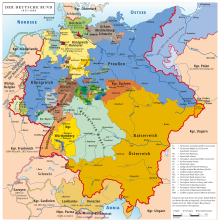Small states

Small states are usually a derogatory, German-language catchphrase for a federal structure that is perceived as particularly pronounced , especially with regard to territorialization and federalism in Germany .
As early as the beginning of the 18th century, criticism of Germany's small states was occasionally expressed in early Enlightenment literature and the desire for a nation-state was publicly expressed. Above all in the circle around the scholar Johann Gottfried Gregorii , writings were created for an all-German reading public, which had the history , geography , cartography and legends of the cultural and linguistic nation as their content and thus manifested the unity of German literature.
A century later, during the French era , a society of Weimar scholars led by Friedrich Johann Justin Bertuch remembered the all-German view of the visionary and enlightener:
“... just with the otherwise fabulous Joh. Gottfried Gregorius (under the assumed name Melissantes) formed at the beginning of the XVIII. Century a view that would have been worthy of further pursuit if it had found the same great receptivity everywhere. His curious description of some previously famous, partly devastated and destroyed, but partly rebuilt mountain castles in Germany, combined with his newly opened scene of memorable history, on which the construction and devastation of many famous cities and castles is presented (2. Th. 1715) was calculated for a fatherland that was not restricted by the narrow boundaries of the sovereign territories, but since the fatherland lacked the fatherland, just as man lacked the patriot, the general interest that the patriot wanted to arouse went in the particular, and that special in the lack of general under ... "
The term in the strict sense was first in 1814 by the Pan-German - nationalist set "father of gymnastics" Friedrich Ludwig Jahn as a political slogan used and spread in the German language. In Ecce Homo , The Happy Science , Götzen-Twilight and Beyond Good and Evil , Friedrich Nietzsche applied the word to the pan-European situation of his time. The word "small states" was also applied to pre- Risorgimento Italy . The work A kelet-európai kisállamok nyomorúsága by István Bibó on the situation in Eastern Europe from 1946 was published in 1992 in a German translation under the title The misery of Eastern European small states .
See also
Web links
Individual evidence
- ^ Johann Gottfried Gregorii alias Melissantes: GEOGRAPHIA NOVISSIMA , Part 1, 1st edition, Frankfurt am Main, Leipzig [and Erfurt] 1708, p. 1126.
- ↑ Burkhard Gotthelf Struve (ed.): Explained teutsche Reichs-Historie , Jena 1720.
- ^ Johann Christoph Weigel and Johann Gottfried Gregorii: Continued ATLAS PORTATILIS GERMANICUS. Nuremberg 1723–1780.
- ↑ Melissantes: The renewed antiquity, or curieuse description of some previously famous, partly devastated and destroyed, but partly rebuilt mountain castles in Germany / presented from credible historicis and geography with many memorable antiquities, and together with two registers prepared by Melissantes , Frankfurt , Leipzig [and Erfurt] 1713/1721.
- ^ Friedrich Justin Bertuch: General geographical ephemeris , vol. 34, Weimar 1811, pp. 71/72.
- ^ Friedrich Maurer, Heinz Rupp: Deutsche Wortgeschichte , Part 2, 1974, p. 516 Online
- ↑ §2
- ↑ §377
- ↑ §39
- ↑ §208
- ↑ Werner Stegmaier : Nietzsche, the Jews and Europe . In: European Philosophy . De Gruyter , Berlin 2000, ISBN 3-11-016900-2 , pp. 81 ( online ).
- ↑ The possession of Veneto and the importance of the New Italian Empire . Published by Julius Springer , Berlin 1861, p. 167 ( online ).
- ^ The misery of the Eastern European small states. New Critique Publishing House , accessed on January 2, 2014 .